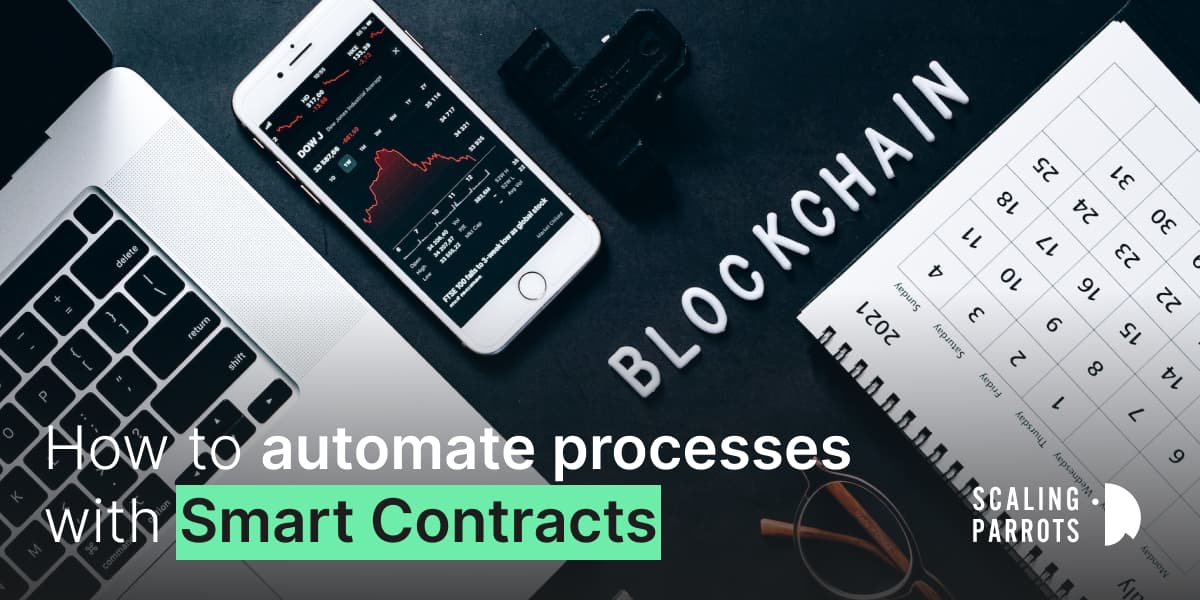
Nick Szabo coined the term “smart contracts” in the 1990s. At the time, he described a smart contract as a tool that formalizes and secures computer networks by combining protocols with user interfaces.
Szabo investigated the potential use of smart contracts in various fields involving contractual agreements, such as credit systems, payment processing, and content rights management.
In the world of cryptocurrencies, a smart contract is an application or program that runs on a Blockchain. They generally serve as a digital agreement enforced by a set of rules. These rules are predefined by computer code, which is replicated and executed by all nodes in the network.
Smart contracts on the Blockchain enable the development of trustless protocols. This means that two parties can commit using a Blockchain without knowing or trusting each other.
The contract will not be executed if the conditions are not met. Aside from that, using smart contracts can eliminate the need for intermediaries, resulting in significant cost savings.
What is a Smart Contract?
A smart contract is a certain type of contract that is written in code and stored on a Blockchain. Smart contracts are self-executing, implying that they can impose the contract conditions without needing a mediator or a third party.
According to the house of higher studies ESIC (Higher School of Commercial Engineers) of Spain, the notion of “intelligent contracts” was defined for the first time by the North American computer engineer, cryptographer and legal expert Nick Szabo in 1994 as “a computer protocol able to execute clauses of a contract”.
Szabo himself used the instance of vending machines where one of the parties inserts a coin through the slot, then selects an output and the machine subsequently delivers it. That is, the machine provides the needed brand because the buyer meets the conditions of the transaction.

In the same way, smart contracts work, they will only emerge to lawful existence if the parties adhere to all the permissive prerequisites. Now, let’s imagine that same functionality with financial output, but instead of utilizing a vending machine, we will use a virtual machine that dwells on a Blockchain.
At this point, our idea can overflow, and it is not exceptional to find out some smart contract experts mention it as a remedy capable of solving nearly all of society’s problems, from corruption to world poverty. Although this appears astonishing, it is still bliss.
What is the Point of Smart Contract
A smart contract is nothing more than a small computer program. What makes them necessarily distinct from other programs is their ability to transfer value (money or various digital assets) innately and without resorting to intermediaries.
The term is used to depict a computer code that automatically executes all or part of an agreement and is located on a platform based on Blockchain technology.
This code may be the statements made by the parties to the concurrence or a supplement to the traditional written contract to execute certain situations, for instance, transferring funds from one party to another.
The code itself is duplicated through diversified links in a chain (Blockchain) and, in turn, benefits from the security, perpetuation and immutability presented by the Blockchain.
Provided that the parties indicate that at the beginning of the transaction, definite specifications have been attained, the code will execute the equivalent act per those parameters.
In other words, if A occurs, the corresponding action, such as A1, is carried out. In this sense, smart contracts are quite simple and can be as simple as transferring cryptocurrencies from one wallet to another when certain assumptions are met.
Smart contracts can support increasingly complex operations as Blockchain adoption grows and more assets are tokenized. However, it will be several years before these contracts can resolve more subjective issues, for example, if one of the parties involved in a commercial contract made sufficient efforts to comply with its provision or whether a criminal clause should be executed.
Smart contracts currently work flawlessly:
- To secure payment when certain criteria are met
- To impose penalties when these objectives are not met.
Once the smart contract is deployed and operational, no human intervention is required, resulting in lower execution costs.
How Do Smart Contracts Work?
Smart contracts are used to execute transactions automatically when certain conditions are met. As previously stated, Nick Szabo first proposed smart contracts in 1996. Szabo is a computer scientist and legal scholar who created the concept of smart contracts to make online contractual agreements easier.
Since then, the idea of smart contracts has been implemented in various ways, including on the Ethereum Blockchain.

A “solidity contract” is Ethereum’s term for a smart contract. Solidity contracts are written in programming language and run on the Ethereum Virtual Machine (EVM).
When a solidity contract is created, it is stored on the Ethereum Blockchain. The contract’s code is public and can be viewed by anyone. However, the data associated with the contract (such as account balances) is encrypted and can only be accessed by those with private keys.
Solidity contracts can be used to build decentralized applications (dApps). dApps are applications that run on a decentralized network, such as the Ethereum Blockchain. dApps have several advantages over traditional applications, such as increased security, transparency, and immutability.
Smart contracts use a computer algorithm stored within the Blockchain to activate and automate the execution of contractual agreements only when specific criteria are met (“if X happens, then X something else will happen”).
A contract in the Blockchain establishes that for each action of one of the users, an automated consequence that affects the other is conditioned. In a smart contract for the sale of a house, for example, when the buyer pays the seller the money, the smart contract immediately transfers the title to the buyer from the seller.
Example of How a contract in the Blockchain Works
Smart contracts can revolutionize many industries by making business more efficient and secure. Consider the following scenario: you want to buy a house. A traditional contract would necessitate hiring a real estate agent, lawyer, and closing company to assist you with the paperwork and transaction.
This can be an extremely expensive and time-consuming process. You could simply send your purchase offer to the seller using a smart contract, and this purchase offer could be sent using your smartphone.
When the seller accepts your offer, the contract will be automatically executed. Because there would be no need for a third party, the entire process would be much faster and less expensive. Smart contracts are not only more efficient, but they also provide greater security because they are stored on a Blockchain.
This means they cannot be changed or tampered with once both parties agree. As a result, they are an excellent choice for high-value transactions requiring trust.
The Relationship Between a Smart Contract With Traditional Written Contracts
One of the challenges in comparing smart contracts to traditional contracts is that they are based on different paradigms. Smart contracts are developed and deployed without using a set of written clauses.
In this regard, a BBVA Bank Financial Inclusion Unit report defines smart contracts as “any contract that is executed automatically by itself between the individual participants without the mediation of third parties.”
However, there is the possibility of integrating this technology with traditional contracts and existing provisions via a traditional format but using the smart contract’s qualities for execution.
Without denying the computer or technological nature of smart contracts, the legal perspective indicates that they have legal significance that the Law cannot ignore.
Because they are typically written with the intention of producing legal effects, this computer code serves as the support and expression writing of an existing agreement that is intended to be automatically executed.
Similarly, unlike traditional contracts, where discussions about their content and interpretation can arise, smart contracts limit the different interpretations that the stipulated content could have because it is configured as a computer protocol capable of making what was agreed come true and nothing more.
Although this is a unique characteristic of smart contracts, it can also be a significant problem because what is placed or established in the Blockchain in these contracts cannot be changed in principle. As a result, they must be taken into account extreme diligence and care in the manner in which the data is stored.
What are the Benefits of Smart Contracts?
There are numerous advantages to using smart contracts, which include the following:
- By eliminating the need for third-party intermediaries such as lawyers or brokers, they can save time and money.
- Providing a transparent and tamper-proof record of all transactions can help reduce fraud.
- They can automate complex financial transactions and supply chain management processes.
- They offer more security and privacy than traditional contracts.
- They are more accurate and have fewer errors.
Smart contracts are not only more secure than traditional forms of document authentication, but they also allow for almost complete automation of the entire process.
However, they still have downsides, which are as follows:
- Consumers lack confidence because it is a new technology they do not yet understand.
- Difficulty making changes. For example, if one of the parties changes their mind, it is difficult to change the terms of the smart contract. If a price or terms for the rental of a property have been established, it may be difficult to make changes to these already configured elements.
- Coding errors. Although it is a human error-proof system, once the code is written, if the programmers make an error, it will affect the entire system, putting it in danger.
Real-World Examples of Smart Contracts
Ethereum, EOSIO, and Hyperledger Fabric are just a few platforms allowing developers to create and deploy smart contracts.
Here are some real-world smart contract examples:
1. Insurance: The insurance industry loses millions annually due to claims processing. Furthermore, the industry is liable for paying for false claims. Smart contracts could be a significant technological advancement for the insurance industry.
Smart contracts could make policy administration easier for businesses or individuals while ensuring consistent error cheques to improve claim processing.
A smart contract can automatically process claims and pay out benefits when certain circumstances are met. For example, if a policyholder is hospitalized for more than three days, the contract may require the daily benefit amount to be paid.
2. Supply Chain Management: Smart contracts, as self-enforcing contracts, can operate independently of any intermediaries or third parties. A smart contract for an end-to-end supply chain would not require any daily management or auditing. Any deliveries received outside the schedule may result in pre-agreed-upon escalation measures to ensure a smooth operation.
It could be used to track the shipping of goods through a supply chain and ensure that everyone in the chain fulfils their obligations. For example, if a shipment of parts is delayed, the contract could automatically notify the customer and arrange expedited delivery.
Datahash, formerly Entrust, is Australia’s first full-service agricultural supply chain platform. It is working to stop the $3 billion-a-year counterfeit wine market. The platform trusts the Hedera Consensus Service to trace its data.
3. Real Estate: It could be used to manage the sale of a property without the need for a third party (e.g., escrow). The contract could include all of the terms of the sale (e.g., price, closing date) and automatically transfer ownership of the property if those conditions are successfully met.
You can offer fractional ownership of real estate using smart contract technology. Instead of one person owning a property, you can segment ownership so that people can purchase tokens of the property.
When someone owns a token, they own a portion of the property. This makes it simple for anyone to enter the property market and make micro-investments.
Applications
Some believe that Blockchain technology can be used to manage digital identities, securities, derivatives, financial information, mortgages, real estate registrations, logistics chains, production chains, insurance of all kinds, and hospital and medicine administration, among other things.
Smart contracts, on the other hand, can be used in various contexts and subjects, according to Maher Alharby and Aad Van Moorsel.
Some of these include: the internet of things and smart property, such as smart contracts for leasing, buying and selling, and so on; intellectual property rights in musical works; and the facilitation of electronic commerce and the reduction of transaction costs.
Conclusion
To sum it up, we believe smart contracts were created to implement individual businesses rather than resolve conflicts. Smart contracts are designed to make transactions more accessible, simpler, more agile, and less expensive.
All of this will undoubtedly result in a fundamental transformation, a paradigm shift in how people design their businesses and conduct their transactions. All of this will necessitate the advice of a lawyer, preferably one who specializes in new technologies and assists merchants and other individuals in using this tool correctly.
In this regard, most countries will require advanced infrastructure and capable human resources. However, we believe that many countries today are still a long way from achieving that goal and that the world population does not use smart contracts daily.
Finally, the COVID-19 pandemic pushed the future forward by forcing us to rethink how we do business, manage a state, and administer justice. As a result, we have no other choice but to enter the digital world and reconsider our profession.
See you soon,
Scaling Parrots
